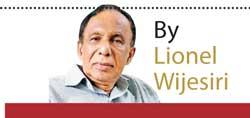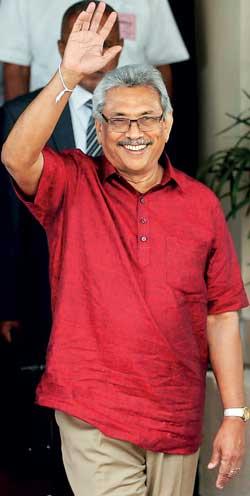Reply To:
Name - Reply Comment
(1) Priority to national security.
(2) Friendly and non-aligned foreign policy
(3) Clean governance
(4) People friendly constitutional reform
(5) Productive citizen – Fruitful human resources
(6) People centric economy
(7) A society based on technology
(8) Development of natural resources.
(9) Sustainable environmental management
(10) Disciplined, law abiding and a moral society
 The people have spoken and their decision is sovereign. We all have to respect it.
The people have spoken and their decision is sovereign. We all have to respect it.
I congratulate His Excellency President Gotabaya Rajapaksa on his impressive electoral victory and wish him success and good luck throughout his career.
Since I am a senior citizen, I have had the privilege of casting my vote for all Presidential elections since 1982. Within these 37 years I have realised that every President who held the reins had his (or her) own strengths and weaknesses. The difference is that some of them had more weaknesses than strengths.
 During the same period, I experienced, with fear and remorse, the spread of centralisation of power, severe racial and religious conflicts, corruption, nepotism, impunity, intimidation, human rights violations and more. The worst among them was corruption, the mainstay of which that it has become a system. Business people, politicians, military and police and bureaucrats knew what the system was, and they all benefited from it. The system channeled corrupt funds from every level of the organizational hierarchies to the top.
During the same period, I experienced, with fear and remorse, the spread of centralisation of power, severe racial and religious conflicts, corruption, nepotism, impunity, intimidation, human rights violations and more. The worst among them was corruption, the mainstay of which that it has become a system. Business people, politicians, military and police and bureaucrats knew what the system was, and they all benefited from it. The system channeled corrupt funds from every level of the organizational hierarchies to the top.
Of course, there are few plus points, too. Sri Lanka has shown steady growth over an year although key macroeconomic challenges persist. We are now a middle-income country with a GDP per capita of USD 4,100. Our social indicators rank among the highest in South Asia and compare favourably with those in middle-income countries.
Campaign
Gotabaya’s campaign was divisive to many Sri Lankans, and upended the conventional wisdom of most professional politicians. But he spoke to the concerns of a people too often ignored by the mainstream media and ruling party elites. He offered ten policy facets: (1) Priority to national security. (2) Friendly and non-aligned foreign policy. (3) Clean governance. (4) People friendly constitutional reform. (5) Productive citizen – Fruitful human resources. (6) People centric economy. (7) A society based on technology. (8) Development of natural resources. (9) Sustainable environmental management. (10) Disciplined, law abiding and a moral society.
He guaranteed a vision of a secure nation. He said, “ My main task would be to ensure that our motherland which is once again under threat from terrorist and extremist elements is safe and protected. We have to ensure that the peace that was won with much sacrifice is maintained”.
“We must once again ensure that people of the Sinhala, Tamil, Muslim, and other communities of this country are able to live together harmoniously, with honour and dignity in an undivided country, under one law.”
He kept on emphasising that he has clearly understood what people expect from him. “Above everything else,” he said, “it is national security. Once we establish national security, achieving economic development will not be an insurmountable challenge.”
“National Security” was the watch word of his campaign.And it really worked.
Suitability
While watching the final stages of the release of election results, one of my friends – an ardent supporter of Gotabhaya, asked me, “He is a fine administrator, there is no doubt. But is he capable of running a muddled country like Sri Lanka?”
Whether President Gotabaya Rajapaksa has the qualities needed to succeed as an efficient President, only time can tell us. I told my friend that if I am asked by the President what traits and attributes, he needs to make him an effective President, I would deliver the following 7 pieces of advice to him.
Advice No 01
As the seventh executive President of this country, you are now entering an unmarked and uncharted territory. As Richard Reeves, author of the book “President Kennedy: Profile of Power,” said, although the job as an Executive President is “sui generis” – (meaning constituting a superior class of its own), a Presidency will be granted by the majority of the constituents in a country as an act of faith and trust. Make yourself a firm determination that you will honour that trust right throughout your term and do not ignore or betray it under any circumstance.
Advice No 02
You must genuinely understand that you wouldn’t be having all the answers to all the problems. And therefore, surround yourself with seasoned and experienced, thoughtful experts who would not be simply be yes men and women, but be willing to challenge you on crucial issues, to say that you are wrong and need to change.
Of course, you may make their own independent judgments. You may, on and off, act contrary to the advice you are receiving. But, nonetheless, you must only act after you have listened to different points of view and then had the opportunity to make up your mind.
You must be a President who is willing to listen to people and willing to adjust your position, as and when necessary.
Advice No 3
Multitasking is also a virtuous trait for you as a President – especially the ability to absorb and mediate sometimes-contradictory pieces of information.
A good metaphor to think about the Presidency would be an air traffic controller with 30 planes in the air at any given moment, all of which think they’re about ready to run out of fuel or need to make an emergency landing. There’s a lot happening. It is a crisis situation and there will be a lot of conflicting voices. And you need to be a person who has the temperament that has the ability to operate in an orderly way. You should be able to respond to each of them in a calm but appropriate fashion. Not losing your temper at all.
Advice No 4
You should gain complete control over the bureaucracy that will carry out your policies. It involves appointing honest and effective cabinet members and efficient and experienced senior officers as the first step to tighten your hold on the government. It is not gong to be easy. You will face lot of pressure from vested interests. Stand by your convictions. Use your diplomacy, tact and boldness to get what we want.
Beyond that, seek out the top experts in Sri Lanka to help you create an accountable management system that will translate your policies into action.
Advice No 5
One more important quality you need to develop and sustain is nimbleness - the ability to assess rapidly changing circumstances and quickly adjust to them. Without lamenting what cannot be controlled, you need to quickly adjust yourself to each crisis. If at all possible, to treat each crisis as an opportunity. How you deal with each one of them is likely to shape your legacy.
I remember one of the sayings of Abraham Lincoln which is relevant here. He said, “There are only few things wholly evil or wholly good. Almost everything, especially of government policy, is an inseparable compound of the two, so that our best judgment of the right selection between them is continually demanded.”
Advice No 6
You may be the President yet an ordinary human being. Therefore, you will make mistakes. When they happen, there will be tremendous internal pressure to downplay, ignore or conceal them. Don’t do it. Acknowledge you have erred. Remember, sunlight is said to be the best of disinfectants. If you figure out what went wrong in the past, you’re less likely to make a similar mistake in the future.
Be prepared to change your mind when the facts warrant doing so - and be prepared to tell the people you have. Most of them will accept it if you explain to them, in an honest and candid way, why you have gone wrong.
However, keep in mind this broader point: The public will judge you on outcomes far more than they will on process. They want you to get decisions right, even if getting it right requires you to change your previous views.
Advice No 7
Finally, keep in mind, above all, that you’re the one person in public life who was elected to represent the entire nation. There will be a temptation to take the low road now and then. Resist it. There is honour in doing so.
Pick up the “watchword” from Barack Obama. Empathy! It was his watchword on his first presidential campaign, in 2008. “Empathy,” he wrote, “is at the heart of my moral code, not simply as a call to sympathy or charity, but as something more demanding, a call to stand in somebody else’s shoes.” It was a fine ideal. Maybe, you too can use it.
Like you, we -the citizens -also want a country that is free of racism and bigotry where no one feels excluded or becomes a victim of prejudice. I believe that only by returning to Buddhist principles upon which our country was founded will enable us to. reach its full potential and stand as a shining model for the rest of the world.
To reach that ultimate level, the following words from Abraham Lincoln’s inaugural Address will be useful. “With malice towards none, with charity for all... let us strive to finish the work we are in, to bind up the nation’s wounds.”
At your best, be guided by a sense of moral purpose. These are times of great challenges. Seek to heal divisions, to bring various parts of the country together, to summon the citizenry to a sense of common purpose. Once these are done, you will be able to use your talents to enlarge the opportunities and lives of people.